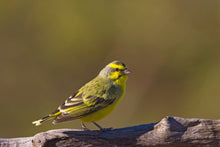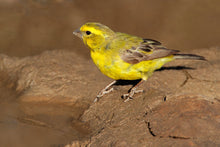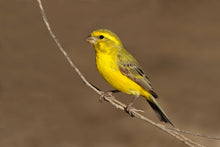Common Names: Green Singer, Yellow-fronted Canary, Crown Canary
ORIGIN
They inhabit semi-arid regions of tall scrub and forest throughout central Africa
SPECIFIC FEATURES
This finch is an aggressive species and is usually seen in pairs or small family parties. They are mature at about 4-6 months of age. Males and females may be distinguished from each other by the necklace of small round black dots around the neck of the hens. The species is slightly longer and more streamlined than other finches. Males have a very pleasant song.
HABITAT DESIGN
Mixed collections should also have at least two or even three feeding stations to prevent Singers from dominating and starving out other co-habitants. They are fond of bathing, so a shallow pond or stream is a good idea. Water dishes should be cleaned daily to prevent their bathing in these fowling their systems if they also have to drink from them.
DIET
Small millets, canary grass seed, amaranth, hulled rice and oats have been taken dry, soaked, and sprouted. The latter two are especially appreciated while raising young and help to stimulate pairs to begin brooding activity. Small mealworms, ant eggs and pupae, waxworms, bee moth larvae, and termites are eagerly taken while raising young but otherwise should be limited because they are too fattening. Green food is also an important element in their diet.
BREEDING
Providing plenty of live food, soaked or germinated seed, and green food will usually induce this species so go to nest. They will build in an open canary nest, an open-fronted finch nestbox or one with a large entrance hole, a dense shrub, on a ledge, and, in one case, on a light socket. They like plenty of soft lining material and natural fiber such as kapok and short cut and shredded burlap work well for this.






